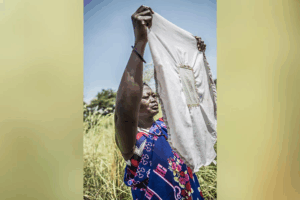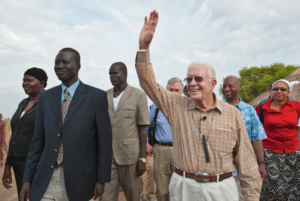A new documentary chronicles President Jimmy Carter’s nearly four-decade campaign to eliminate guinea worm disease—an ancient parasite that once afflicted millions—using education and clean water rather than vaccines or medication.
When President Jimmy Carter first encountered guinea worm disease in 1986, the World Health Organization estimated 3.5 million cases of the parasitic infection across Asia and Africa. By the time of his death in December 2024, that number had dropped to just 14 cases. As of September 2025, only four provisional cases remain.
This remarkable achievement—documented in the new film The President and the Dragon, now streaming on Amazon Prime Video—represents more than a public health victory. It demonstrates what becomes possible when communities unite around a common goal.
An Ancient Enemy
Guinea worm disease spreads through contaminated water and undercooked fish. Once ingested, larvae penetrate the intestinal wall and migrate through the body. The adult female worm can grow up to three feet in length and typically moves to the lower limbs, where it causes painful blisters that can lead to temporary or permanent impairment.
The transmission cycle is particularly insidious: to relieve burning pain, infected individuals submerge affected limbs in streams or ponds, triggering the release of thousands of larvae that contaminate the water source. When others drink from that source, the cycle continues.
For centuries, this parasite—described in the documentary as “this fiery serpent, this terror, this ill”—seemed unstoppable. Medicine didn’t work. Neither did vaccines.
A Different Approach

What makes the guinea worm eradication effort extraordinary is its method. Unlike smallpox—the only other human disease ever eradicated—guinea worm is being eliminated without vaccines or medication. Instead, the campaign relies entirely on education, clean water access, and community participation.
After leaving office, Carter learned about guinea worm’s devastating effects from his former drug czar, Dr. Peter Bourne. Funding was scarce, so the former president made elimination of the disease his life’s mission, championing the global effort from 1986 until his death.
“My grandfather desperately wanted to outlive Guinea worm, and he came remarkably close to doing it,” said Jason Carter, Carter Center board chair and President Carter’s eldest grandson, in a statement from the Carter Center. “He witnessed firsthand what freeing a community from this terrible disease meant to people’s daily lives, and The Carter Center will keep working until there are zero cases.”
Even in hospice care, Carter continued asking about case numbers, his concern focused not on himself but on the program’s progress.
The Power of Partnership
Co-director Waleed Eltayeb, who wrote and produced the film, emphasized in an NPR interview that this success story extends far beyond one person. “The success of this eradication program does not happen without the people on the ground,” he said. “It does not happen without the volunteers. It does not happen without the local doctors. It does not happen without partnership.”
The documentary, which Eltayeb co-directed with Ian D. Murphy, deliberately showcases the individuals who led the fight—public health professionals, local volunteers, and even former child soldiers who became what Eltayeb calls “Guinea worm warriors.”
One such warrior is Garang Buk Buk Piol, who carried an AK-47 as a 12-year-old child soldier in Sudan’s long civil war. He transformed into an activist and philanthropist, teaching underprivileged communities and building schools. “These programs are fighting disease, waging peace and building hope,” Eltayeb told NPR. “Look at the stories behind the numbers, and then you truly begin to see the impact of these health programs.”
The film also examines Carter’s role in helping end the civil wars between north and south Sudan—Eltayeb’s homeland and one of the countries most afflicted by guinea worm.
Technology and Education

Technology played a crucial role in the campaign. LifeStraw, the company known for its portable water filtration devices, partnered with the Carter Center to provide clean drinking water solutions. According to interviews conducted at the Carter Center in Atlanta, the eradication program combined education, technology, surveillance, and coalition-building to drive down case numbers.
Yet the human element remained central. Eltayeb wanted viewers to feel connected to the individuals affected by the disease. “One of my key visions for the film is that I wanted this sense of people looking directly into the camera,” he told NPR. “Almost as if they’re staring into your eyes, and you’re staring into their eyes to let you know how this disease is affecting other human beings.”
A Message for Today
Released on October 1, 2025—what would have been President Carter’s 101st birthday—the documentary arrives at a moment when conflict and division seem overwhelming. Sudan remains in turmoil. Wars continue across multiple continents.
Yet Eltayeb sees the film as offering something essential: hope. “For me, this film is basically about one of the most important things that we as human beings cannot do without, and that’s hope,” he said. “It showcases very clearly the power of us when we come together. When we decide that we want to put differences aside and focus on doing things that are for our collective good and for the betterment of humanity. There is nothing that we can’t achieve.”
The near-eradication of guinea worm demonstrates that even ancient problems can be solved when communities work together with sustained commitment. If successful, guinea worm will become only the second disease ever eradicated from Earth—a milestone achieved not through pharmaceutical intervention, but through education, clean water, and human cooperation.
As Eltayeb reflected on current global conflicts, he acknowledged the difficulty of maintaining optimism. But he hopes viewers will “see the spirit of hope that exists in this film. That they can see the fact that people can put aside differences and work for the greater and collective good of humanity.”
With only four provisional cases remaining as of September 2025, that greater good is finally within reach.
Watch the official trailer:
This summary is based on the following articles:
- A new documentary about a dastardly worm and a heroic effort by Jimmy Carter, by Michal Ruprecht for NPR’s Goats and Soda
- The President and The Dragon, from The Carter Center
- How President Jimmy Carter Slayed a Dragon and Is Helping to Eradicate an Ancient Disease, by Stephen Beacham for CNET
Related Articles

Only 15 Guinea Worm Cases Reported Last Year
The prospect of eradicating Guinea worm disease remains on track, with just 15 human cases reported in two countries in 2024, reports The Carter Center.

Jimmy Carter Took on the Awful Guinea Worm When No One Else Would — And Triumphed
The effort to end Guinea worm disease relies almost entirely on changes in people’s behavior. There is no cure, no vaccination. When the 39th president of the United States left office, Jimmy Carter campaigned to eradicate the disease.

The Unstoppable Makoy Samuel Yibi and the Quest to Eradicate Guinea Worm
Makoy Samuel Yibi’s relentless efforts have brought Guinea worm disease to the brink of eradication. With support from the Carter Center, Makoy traverses rugged terrain in South Sudan to contain outbreaks and prevent future infections.

